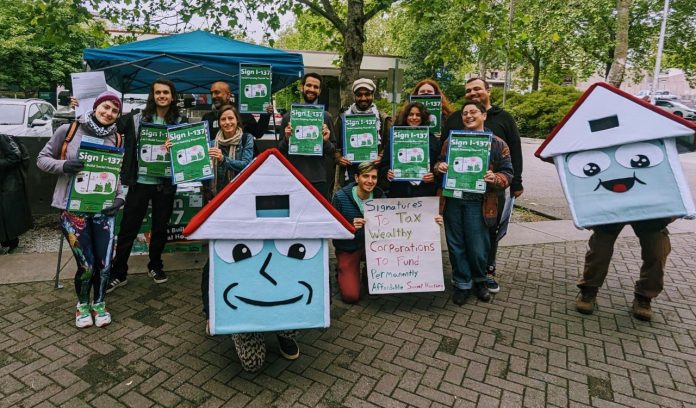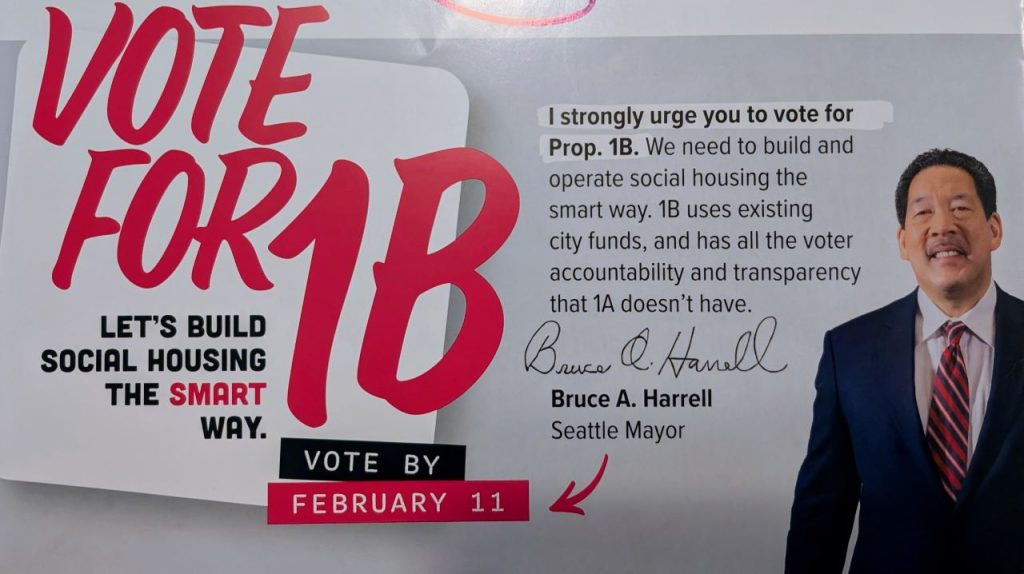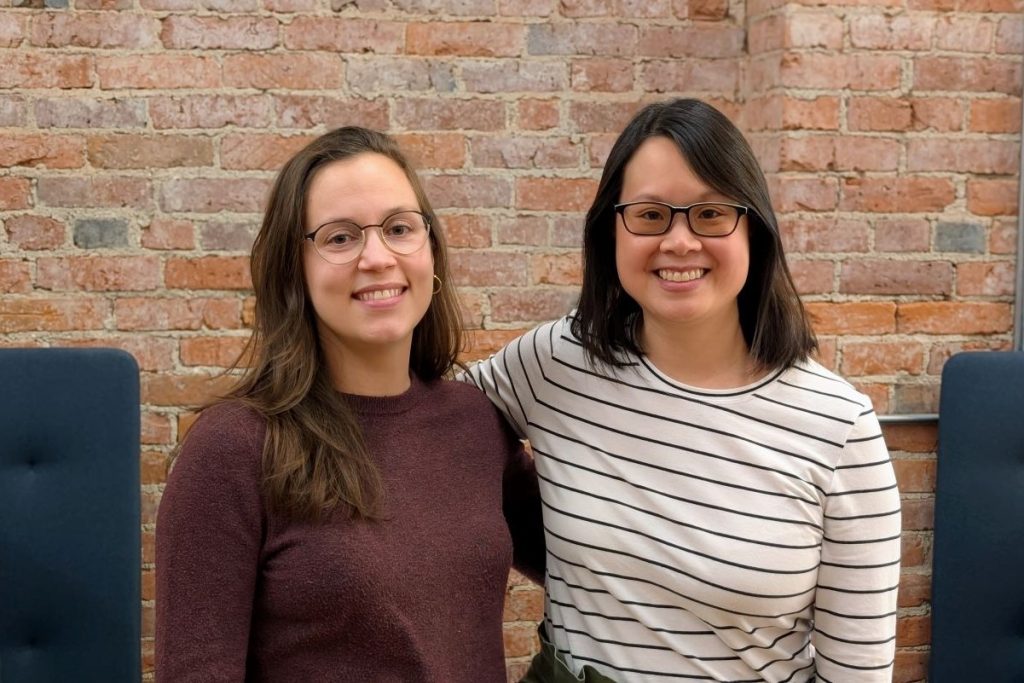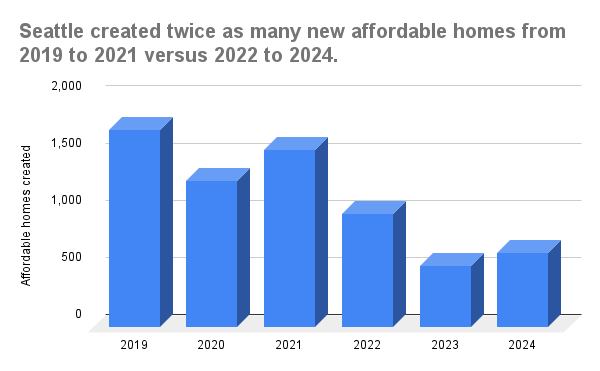
On Monday, Mayor Bruce Harrell announced authorizing legislation for a $2 million bridge loan to the Seattle Social Housing Developer. The loan is an advance on the estimated $50 million in dedicated annual revenue that social housing advocates secured via Initiative 137 (or Proposition 1A, as it appeared on ballots) in a landslide special election victory this past February.
I-137 authorized an excess compensation tax, targeting employers who compensate individual employees in excess of $1 million, but it won’t begin pulling in revenue until early 2026. Since it hit high-paid executives, that tax earned the ire of big business while Harrell and his centrist allies on Council opposed the ballot measure. Voters ultimately saw it differently.
The short-term loan would allow the new public development authority to begin scaling up and advancing plans to create publicly owned, publicly financed, mixed-income housing in Seattle. It addition to sustaining core operations, the loan may allow the public developer to “potentially pursue near term property acquisition opportunities until the first tranche of new revenue generated,” the mayor’s release noted.
So far, the Seattle Social Housing Developer or SSHD has received about $1 million in start-up support over its first 18 months of operations. Passed by voters in 2023, Initiative 135 created the SSHD and required the City to provide start-up support for the first 18 months of operation. “The City has provided $870,000 in financial assistance to the developer to meet this obligation, in addition to $180,000 from the Washington State Department of Commerce for a total of $1,050,000 in start-up support,” the Mayor’s Office said.
The startup funding helped launch SSHD operations, in particular hiring its CEO Roberto Jiménez, who previously worked in the Sacramento Valley developing farmworker housing.
“The Seattle Social Housing Developer is focused on addressing the city’s urgent unmet need for affordable housing that many of our citizens have experienced through the establishment of the innovative social housing model,” Jiménez said in a statement. “This housing will be inclusive for all residents, including low-income households and working people like teachers, service workers, firefighters, and more. This loan from the City will allow us to build out the staffing and operational support needed as we look towards property acquisition to make this vision a reality in Seattle.”
In a March interview with The Urbanist, Jiménez noted the SSHD is itching to begin acquiring property, and was hoping to get an advance on expected revenue.
“The real issue, I think, is that there are real estate deals, projects available, and we’ve getting a lot of phone calls,” Jiménez said. “There are properties that are developed, that we could acquire and put them to social housing make them permanently affordable. And there are properties out there that we’ve been analyzing, that we’re very interested in, all just to get that tax revenue flowing in.”
Without the bridge loan, the SSHD could be in a financial pinch to cover its operational costs under ballot measure funding kicks in.
Legislation heads to Dan Strauss’s committee
Councilmember Dan Strauss (District 6) was among the few councilmembers who didn’t vote to put Council’s competing Proposition 1B on the ballot — a weaker alternative that would have resulted in much less revenue over a limited period of time, repurposing existing payroll tax revenue. Strauss and Cathy Moore (District 5) were absent for the vote, while Tammy Morales (District 2) cast the only vote against running Prop 1B.
The effort came at the Seattle Metropolitan Chamber of Commerce’s behest and was clearly intended to hinder Prop 1A’s chances. Harrell endorsed Prop 1B and appeared prominently on campaign mailers urging voters to back it and oppose the grassroots Prop 1A.

“Voters have been clear,” Strauss said. “Seattle is ready for social housing. Now, we need to do everything we can to make sure this transformative investment is successful. This agreement will help ensure the Social Housing Developer has the resources they need now to hit the ground running next year, when tax revenue starts coming in.”
Harrell said he would transmit loan legislation to the City Council for consideration in the Finance, Native Communities & Tribal Governments Committee, which Strauss chairs. Ultimately, it’s the Council President who decides which committee legislation is heard in.
After Prop 1A’s decisive victory earlier this year, councilmembers who backed Prop 1B have generally said they would respect the will of voters and seek to support the SSHD as it scales up to invest the new revenue.
Harrell pitches progress on housing
Harrell’s statement alluded to his earlier efforts to block the grassroots funding measure, but he argued he shared a vision for social housing and framed the differences as minor.
“While there were different strategies for how to fund the social housing developer, we share a vision for this model to be successful and add more housing options across our city,” Harrell said in a statement. “This loan will provide critical support during this interim period for planning and capacity-building so that the developer is set up for success and can achieve its goal of operating publicly owned, mixed-income housing.”
Additionally, Harrell announced that he is appointing Brian Abeel to serve on the Seattle Social Housing Board, as recommended by CEO Jiménez. “Abeel is an experienced finance executive with extensive non-profit board experience who will bring these critical skills to the board as they begin overseeing more capital projects,” the Mayor’s Office said.
Harrell’s announcement also pivoted to point to broader housing wins his administration oversaw: “Through an expansive One Seattle Housing Agenda, Mayor Harrell continues to drive progress to support more affordable housing and greater housing production in the city. In 2024 alone, Seattle added 14,683 new homes, a record high.” Not mentioned: new permit applications have reached record lows, as interest rates remain high and market uncertainty pervades.
The mayor also pointed to his One Seattle Comprehensive Plan as expanding housing opportunities across the city — though it has yet to make it through the legislative process. Under the state Growth Management Act, the Comprehensive Plan was due at the end of 2024, but it still has not been passed into law after numerous legal delays, internal revisions, and last-minute tweaks.
After passing temporary interim legislation to meet the state deadline to allow middle housing (such as fourplex townhomes) citywide, Council is aiming to approve the Comprehensive Plan later this year and follow up with permanent zoning legislation next year. The City has said the zoning changes would roughly double Seattle’s housing capacity, if and when they are finally approved.
House Our Neighbors was the nonprofit advocacy group that ran the I-135 and I-137 ballot measures and the group’s co-executive director Tiffani McCoy applauded the bridge loan.
“We are grateful to Roberto Jiménez, the Seattle Social Housing CEO, for working to negotiate this bridge loan for the Prop 1A funds. Thanks to the Mayor and City Council for securing this loan,” McCoy told The Urbanist. “We hope the Mayor and City Council will show similar support to the social housing developer in the City’s Comprehensive Plan update.”

McCoy said that affordable housing bonus proposed in the new plan would not work for social housing model. The mayor’s proposal had floated the possibility or achieving 12-plex buildings on a typical 5,000-square-foot single family lot within a quarter mile of frequent transit via the affordability bonus. The proposed bonus would require at least 50% of the units are affordable to low-income households.
“As it stands now, social housing would not be eligible for affordable housing bonuses that are only available for income-restricted affordable housing developers across our city,” McCoy added. “It is crucial social housing is included in these density bonus schemes to ensure the comp plan maximizes every tool in the city’s toolkit to deliver housing. Though many candidates have talked about their support of social housing, we are not seeing it in the comprehensive plan process.”
Despite the squabbles over details, Harrell has stressed that housing remains a top priority.
“Increasing housing supply and diversity have been top priorities for my administration, creating more safe, affordable places for people to call home,” Harrell said.
Harrell pointed to “passing the largest housing levy in City history in 2023” as another victory. That $970 million levy tripled the size of the previous levy it renewed, but unfortunately due to inflation and a financially reeling nonprofit housing sector, the increase in levy funds has not led to an increase in the rate of affordable housing production.
The Seattle Times recently covered the issue, noting several of Seattle largest nonprofit housing developers are at risk of financial collapse. Instead of funding the construction of new affordable homes, City housing funds have increasingly gone toward stabilizing existing affordable housing units. Plus, each public dollar cannot be stretched as far due to fast-rising construction and operations costs.

Furthermore, the levy funding bump was partially offset by Harrell’s decision to cut housing funding elsewhere. In his last budget, Harrell reallocated $287 million in Jumpstart payroll tax revenue largely dedicated to affordable housing previously in order to patch a large budget hole and fund around $100 million in new budget priorities.
As part of his broad housing strategy, the mayor also pointed to his efforts to streamline design review and the broader permitting process. However, as with middle housing upzones, it took a state mandate to galvanize Seattle to citywide action. Harrell recently proposed a temporary holiday on design review requirements on new projects in order to get ahead of the state deadline while his administration continues to work on permanent reforms.
Harrell has increased the size of the Fort Lawton affordable housing proposal long in the works, hoping to produce more than 500 homes on the derelict Army base. However, that project remains mired in process and several years away from delivering homes on the ground.
Several of Harrell’s challengers, including frontrunner Katie Wilson, have sought to make his earlier social housing obstruction an issue as he faces a tough reelection fight this fall. In her interview with The Urbanist, Wilson has called for more urgency and concerted action around the issues of housing and homelessness.
“We need city leadership that’s going to step up and work for the people of the city and not for their corporate backers,” Wilson told The Urbanist. “And I think we just saw with the social housing vote on Prop 1A how out of step Harrell is with the voters. He chose to be the face of the opposition campaign that was funded by Amazon and the Chamber of Commerce. Seattle voters overwhelmingly said that they want to see bold action on affordable housing, and so do I. So that’s why I’m running.”
Doug Trumm is publisher of The Urbanist. An Urbanist writer since 2015, he dreams of pedestrian streets, bus lanes, and a mass-timber building spree to end our housing crisis. He graduated from the Evans School of Public Policy and Governance at the University of Washington in 2019. He lives in Seattle's Fremont neighborhood and loves to explore the city by foot and by bike.


